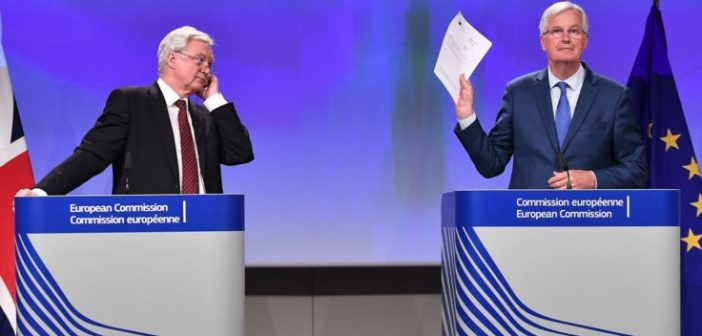The EU chief Brexit negotiator has said there has been no “decisive progress” on key issues in talks with the UK, criticising the UK for demanding the “impossible”.
Michel Barnier said the two sides are still “quite far” away from being in a position to begin talks on future trade arrangements – which the UK is hoping to begin next month.
Mr Barnier was speaking alongside Brexit Secretary David Davis after a third round of talks in Brussels over Britain’s departure from the EU. He said there had been some fruitful discussions but struck a critical, pessimistic tone – at times openly scolding the Government.
“This week provided useful clarifications… but we did not get any decisive progress on the central subjects,” the EU negotiator said.
The EU wants to make “sufficient progress” on three key divorce issues – UK’s financial obligations to the EU, also called “Brexit bill”; the citizens’ rights; and the Irish border – before moving on to discussing a future relationship and trade deals.
The UK maintains some of these divorce issues are “inextricably linked” to a future relationship – a position that was reiterated by Mr Davis.
“We can only resolve some of these issues with an eye on how the new partnership between us will work in future,” he said, in a pointed message to his EU counterpart.
“This is not about skipping ahead or trying to reopen previous discussions, it is about pragmatically driving the process we all want to see.”
Mr Barnier scolded the UK for demanding the “impossible” – including having a say on the EU’s single market rules while being outside of it – in a series of position papers the British Government released in the last weeks.
In an exchange that illustrates the tense atmosphere, Mr Barnier said some of those papers show a “sort of nostalgia” – getting a quick rebuke from Mr Davis. “I wouldn’t confuse the belief in the free market for nostalgia,” Mr Davis said.
Both sides disagreed again on the EU’s demand, firmly rejected by Britain, that the European Court of Justice must be allowed to police the enforcement of rights of EU citizens residing in Britain after Brexit, and vice versa, Mr Barnier noted.
He mentioned a case that was particularly embarrassing for the British Government – the Home Office sending 100 deportation letters to EU citizens by mistake – as proof the ECJ’s oversight is necessary.
“Which such uncertainty – how can we build trust and discuss future relationship?” he said.
“At the current state of progress we are quite far from being able to say that sufficient progress has taken place.”
The Brexit Secretary, trying to strike a more optimistic note, said there had been “some concrete progress”, but acknowledged that “there remains some way to go”.
He called for “flexibility and imagination” and added: “Our discussions this week have exposed yet again that the UK’s approach is substantially more flexible and pragmatic than that of the EU as it avoids unnecessary disruption for businesses and consumers”.
Much disagreement centred around the Brexit bill, with Mr Davis saying the exchanges on the subject had been “tough” and insisting the British Government has a duty to the taxpayer to look into the EU’s stance rigorously.
One issue where discussions had been “fruitful” and “genuine progress” had been made, Mr Barnier said, was the relationship between the Republic of Ireland and Ulster.
The press conference came at the end of a round of talks in Brussels where expectations of a breakthrough were already low.
In a sign of the lack of trust between the two sides, British officials lamented this week that EU negotiators were not being given the freedom to negotiate effectively, but are instead tied by a rigid template.
Meanwhile Theresa May, speaking during a visit to Japan, said the two countries will work “quickly” to establish a new economic partnership after Brexit.
The Prime Minister met with officials and business leaders as part of her efforts to look into future trade deals after the UK leaves the EU in March 2019.
She said the UK would be free to sign new bilateral trade agreements in any transition period after Brexit.
Japan’s Prime Minister Shinzo Abe called for “transparency” and “predictability” in the talks to minimise the impact on the economy, including Japanese companies operating in the UK.

